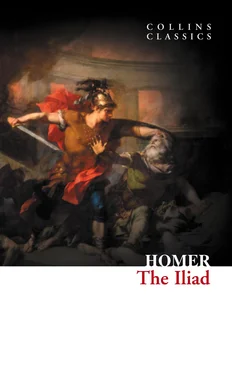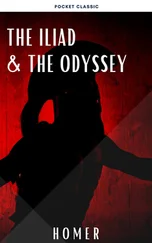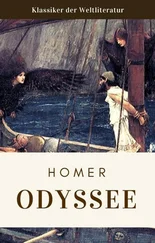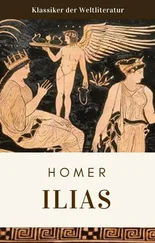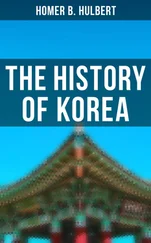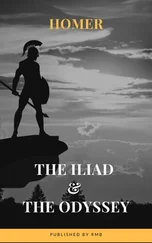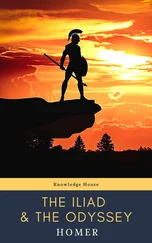Ah! had I died, ere to these walk I fled,
False to my country, and my nuptial bed;
My brothers, friends, and daughter left behind,
False to them all, to Paris only kind!
For this I mourn, till grief or dire disease
Shall waste the form whose fault it was to please!
The king of kings, Atrides, you survey,
Great in the war, and great in arts of sway:
My brother once, before my days of shame!
And oh! that still he bore a brother’s name!”
With wonder Priam view’d the godlike man,
Extoll’d the happy prince, and thus began:
“O bless’d Atrides! born to prosperous fate,
Successful monarch of a mighty state!
How vast thy empire! Of your matchless train
What numbers lost, what numbers yet remain!
In Phrygia once were gallant armies known,
In ancient time, when Otreus fill’d the throne,
When godlike Mygdon led their troops of horse,
And I, to join them, raised the Trojan force:
Against the manlike Amazons we stood,
And Sangar’s stream ran purple with their blood.
But far inferior those, in martial grace,
And strength of numbers, to this Grecian race.”
This said, once more he view’d the warrior train;
“What’s he, whose arms lie scatter’d on the plain?
Broad is his breast, his shoulders larger spread,
Though great Atrides overtops his head.
Nor yet appear his care and conduct small;
From rank to rank he moves, and orders all.
The stately ram thus measures o’er the ground,
And, master of the flock, surveys them round.”
Then Helen thus: “Whom your discerning eyes
Have singled out, is Ithacus the wise;
A barren island boasts his glorious birth;
His fame for wisdom fills the spacious earth.”
Antenor took the word, and thus began:
“Myself, O king! have seen that wondrous man
When, trusting Jove and hospitable laws,
To Troy he came, to plead the Grecian cause;
(Great Menelaus urged the same request;)
My house was honour’d with each royal guest:
I knew their persons, and admired their parts,
Both brave in arms, and both approved in arts.
Erect, the Spartan most engaged our view;
Ulysses seated, greater reverence drew.
When Atreus’ son harangued the listening train,
Just was his sense, and his expression plain,
His words succinct, yet full, without a fault;
He spoke no more than just the thing he ought.
But when Ulysses rose, in thought profound,
His modest eyes he fix’d upon the ground;
As one unskill’d or dumb, he seem’d to stand,
Nor raised his head, nor stretch’d his sceptred hand;
But, when he speaks, what elocution flows!
Soft as the fleeces of descending snows,
The copious accents fall, with easy art;
Melting they fall, and sink into the heart!
Wondering we hear, and fix’d in deep surprise,
Our ears refute the censure of our eyes.”
The king then ask’d (as yet the camp he view’d)
“What chief is that, with giant strength endued,
Whose brawny shoulders, and whose swelling chest,
And lofty stature, far exceed the rest?”
“Ajax the great, (the beauteous queen replied,)
Himself a host: the Grecian strength and pride.
See! bold Idomeneus superior towers
Amid yon circle of his Cretan powers,
Great as a god! I saw him once before,
With Menelaus on the Spartan shore.
The rest I know, and could in order name;
All valiant chiefs, and men of mighty fame.
Yet two are wanting of the numerous train,
Whom long my eyes have sought, but sought in vain:
Castor and Pollux, first in martial force,
One bold on foot, and one renown’d for horse.
My brothers these; the same our native shore,
One house contain’d us, as one mother bore.
Perhaps the chiefs, from warlike toils at ease,
For distant Troy refused to sail the seas;
Perhaps their swords some nobler quarrel draws,
Ashamed to combat in their sister’s cause.”
So spoke the fair, nor knew her brothers’ doom;
Wrapt in the cold embraces of the tomb;
Adorn’d with honours in their native shore,
Silent they slept, and heard of wars no more.
Meantime the heralds, through the crowded town.
Bring the rich wine and destined victims down.
Idaeus’ arms the golden goblets press’d,
Who thus the venerable king address’d:
“Arise, O father of the Trojan state!
The nations call, thy joyful people wait
To seal the truce, and end the dire debate.
Paris, thy son, and Sparta’s king advance,
In measured lists to toss the weighty lance;
And who his rival shall in arms subdue,
His be the dame, and his the treasure too.
Thus with a lasting league our toils may cease,
And Troy possess her fertile fields in peace:
So shall the Greeks review their native shore,
Much famed for generous steeds, for beauty more.”
With grief he heard, and bade the chiefs prepare
To join his milk-white coursers to the car;
He mounts the seat, Antenor at his side;
The gentle steeds through Scaea’s gates they guide:
Next from the car descending on the plain,
Amid the Grecian host and Trojan train,
Slow they proceed: the sage Ulysses then
Arose, and with him rose the king of men.
On either side a sacred herald stands,
The wine they mix, and on each monarch’s hands
Pour the full urn; then draws the Grecian lord
His cutlass sheathed beside his ponderous sword;
From the sign’d victims crops the curling hair;
The heralds part it, and the princes share;
Then loudly thus before the attentive bands
He calls the gods, and spreads his lifted hands:
“O first and greatest power! whom all obey,
Who high on Ida’s holy mountain sway,
Eternal Jove! and you bright orb that roll
From east to west, and view from pole to pole!
Thou mother Earth! and all ye living floods!
Infernal furies, and Tartarean gods,
Who rule the dead, and horrid woes prepare
For perjured kings, and all who falsely swear!
Hear, and be witness. If, by Paris slain,
Great Menelaus press the fatal plain;
The dame and treasures let the Trojan keep,
And Greece returning plough the watery deep.
If by my brother’s lance the Trojan bleed,
Be his the wealth and beauteous dame decreed:
The appointed fine let Ilion justly pay,
And every age record the signal day.
This if the Phrygians shall refuse to yield,
Arms must revenge, and Mars decide the field.”
With that the chief the tender victims slew,
And in the dust their bleeding bodies threw;
The vital spirit issued at the wound,
And left the members quivering on the ground.
From the same urn they drink the mingled wine,
And add libations to the powers divine.
While thus their prayers united mount the sky,
“Hear, mighty Jove! and hear, ye gods on high!
And may their blood, who first the league confound,
Shed like this wine, disdain the thirsty ground;
May all their consorts serve promiscuous lust,
And all their lust be scatter’d as the dust!”
Thus either host their imprecations join’d,
Which Jove refused, and mingled with the wind.
The rites now finish’d, reverend Priam rose,
And thus express’d a heart o’ercharged with woes:
“Ye Greeks and Trojans, let the chiefs engage,
But spare the weakness of my feeble age:
In yonder walls that object let me shun,
Nor view the danger of so dear a son.
Whose arms shall conquer and what prince shall fall,
Heaven only knows; for heaven disposes all.”
Читать дальше
